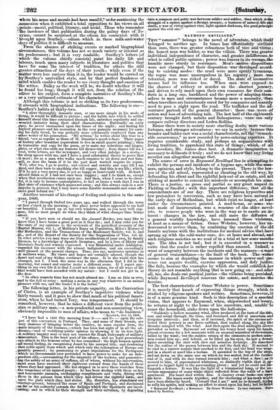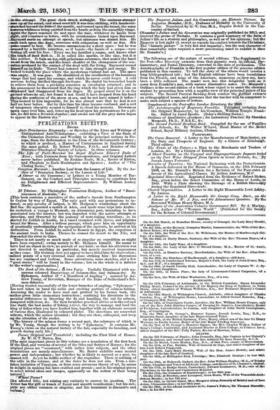' R.LYNOND REVILLORD. * 'Trim " - nominee ", belongs to the novel
of adventure, which itself - belonged' to another age. In times less effeminately civilized than ours,*there‘was . greater robustness both of vice and virtue ;
the honest man was bolder, so was the villain. There was greater individual independence of 'character, and greater indifference, to what is called public opinion ; power was braver in its wrongs, the humble more sturdy resistance. Men's native dispositions -were not -changed, but their 'disposition developed accord-
ing -to existing modes : the cruel were more openly tyramions, the rogue -was more unscrupulous in. his roguery ; more was
tolerated, more was risked or dared. The state of locomotive means' had its influence too. "When men were exposed . to the chances of robbery or murder on the shortest journey, and driven to rely much upon their own resources for their com- forts -in a long • one, -hardihood and the power of adapting-them- wives -to men and circumstances became more a necessity, than
when-travellers are luxuriously cared for-by companies and scarcely need. to pass a night upon the road. The trafficker and the ad- venturer partook of the general character : there :was -more of action and, less of. advertising talk. The last half of-the eighteenth century brought forth nabobs and Robespierres ; ,-ours can only compass railway directors and Ledru-Rollins. Hence there.were in society more startling' deeds, more various fortunes,- and -stranger adventures : we say in society -beoause this broader and balder cast was a social characteristic, not!tlie- ".remark- able occurrences," as now recorded by news-catering reporters. It requires considerable study, and perhaps an acquaintance with
living tradition, to apprehend this state of things ; -which, of all
• our novelists, Mr. James . does best. .A dramatic imagination is neoessaryto delineate it truly ; and-we do not know that any-living novelist can altogether manage that.
The source of error in Raymond Sevilloyci liesin. at :tmpting.to .exhibit the persona and incidents of a bygone age, while man- ners, opinions, and style, belongto the.present. There is the law-
yer of the old school, represented as :cheating-.in the old 'way, by defrauding his client and the rightful heir out of an estate,- and not
sticking at murder to conceal his :misdeeds or accomplish his aims.
There is a justice, as gross. and partial as any great unpaid:in ' Fielding or Smollet ; with this important difference, that all the
-concomitants are of our day. There are religious hypocrites aid low pretenders to conversion, such as may have been .natural in the early days of Methodism, but which exist no longer, at least under the circumstances painted. A mad-house, or.• some :vio- lent snode of incarceration, was a resource of:the older- novel- ists, to remove people who .were.in the way or to excite an:in-
terest : -changes in -the. law, and still more the diffusion of a.-general worldly knowledge, have lessened those -violenoes, at least as a• means of fiction. Grace Webster, however, has -en-
deavoured to revive them, by combining the coercion of the old
lunatic asylums with the institutions for medical adviee that have sprung- up with the cold-water cure, &c. at home.and abroad, -and such religious societies as we read of in a -trial at law some months
ago. The idea -is not . bad ; but it is executed -in a manner so outre .that the reader is rather repelled than amused. Indeed, a .want of congruity between .the incidents and the manners—a want
of general vraisemblanoe—is the fault -of the book. The -wiiter seems to aim: at depicting the manner in which power and pre-
tence can acquire wealth, exercise oppression, and defy justice.
She fails, because-the examples by which she would establish her theory do not resemble anything that is:now going on :.and after
all, too, she.dealsont poetical justice—tile villains being punished, while -Raymond.,Revilloyd recovers the estate,. and marries the heroine.
"The best characteristic .of Grace Webster is power. Sometinxes it is merely that knack of expressing things strongly, which is
studied by religious speakers and writers. Sometimes, however it is of a more genuine .kind. Such is this description of a spectral vision, that appears to Raymond, when, shipwrecked.and. weary, he returns at night to the home -of his . ancestors, . and, unable' to rouse the household, sinks down upon the halbstes. "Suddenly a hollow moaning wind, ,often produced at the tunaof the tide, rose and swept through the trees, and increased and fell at uncertain. and
irregular intervals ; and then, as if incensed, the spirit of the storms col-
lected their potency in one fierce outblast, that rushed along the sky like thunder mingled with -the wind. And then again the dead midnight silence prevailed as before. Raymond sat resting his weary head upon his hands, almost-overcome for a few moments with an unusual-sensation of drowsiness, lulled by the wind ; hut the sudden -return of the .elementsto perfect calm-
ness roused him up ; and behold, as he lifted up his eyes, . he .saw a female figire ascending the stair with slow and noiseless footsteps. He discerned but the outline of the person between him and the dark sky. It seemed to be clad in a narrow mantle that reached to its feet, and the head was wrap- ped in a shawl or scarf like a turban. It ascended -to the top of the steps, andsat down on . tho.eame one on which he was seated, but at the further
end of it, and with its face turned towards him ' • and what a face ! -as at seemed-to him, of supernatural whiteness, so distinctly visible that it ap- peared to impart light to the surrounding gloom ; and yet he could not dis- tinguish a feature. It was like the light of a transparent lamp, or the un- certain appearance of- some white object reflected, from the walls of a dark apartment. His heart died within him. A clammy sweat broke out upon skis ,brow. His knees smote together, and the chattering of his teeth might have been distinctly heard. Coward that I am !' said he to himself, tura to rally his spirits, and making an effort to stand upon his feet; but he failed
• Raymond Revilloyd ; a Romance. By Grace Webster. In two volumes. Pub'. lisbed by BenUey.
in the attempt. The great clock struck midnight. The ominous stranger rose up at the sound, and stood erect till it was done striking, with handsout- stretched beyond the folds-of the mantle, and creased upon the-breast, the same lustrous whiteness being-emitted from the hands as from the unearthly visage. Again the figure resumed its seat upon the stair, withdrew its hands from sight, and remained as before, with its countenance turned upon Raymond. _ .Baymond made an attempt. at speech,. but utterance was denied him. -He sank .back upon . the . flags, overcome with exhaustion as well- as fear. His
• pulse ceased to beat. He became unconscious for a short space : but he was --aroused by a horrible sensation, as if hands—the hands of a corpse—were feeling all over his face. ;Every one has handled a corpse, and knows. what the touch of dead flesh is. . It is called like marble, or like clay, but it is like neither. It feels an icy, stiff, gelatinous. substance, that makes the hand
• recoil from the teach, and the heart shudder at the strangeness of the sen- sation odueed by the contact of the dead-with the living. Raymond-roused up in haste. 'Terror had restored to him streneth and energy. He looked towards'the place where the mysterious visitant had sat. The space -was empty. was gone. lie shuddered at the recollection of theluminous visage that had upset his courage, and which henever could forget. A cold nervous feeling tlled through -ins frame. He chafed his benumbed hands to relieve them from a prickling sensation as circulation returned ; and to his amazement he-discovered that the ring which the --othipboard bad 'disappeared -from. his finger. He groped about for it on the tail/ had given him on g�gzroomad where he sat, but found it not Could it.have dropped from his hand g. the confusion of the storm at sea,- -and-he -not have missed it before ? l'hia seemed to him impossible, for he was almost sure 'that he .1ffid it not half an hour before. But by this' time his ideas became confused, and a sort -of temporary obscurity- seemed to himself to-cloud his memory. Drowsiness 'again came over logo, and, lowering his head upon his for a pil- low, he fell 'into. a ffiverish -slumber ; and awoke net till the grey dawn began to appear in the Eastern sky."



























 Previous page
Previous page